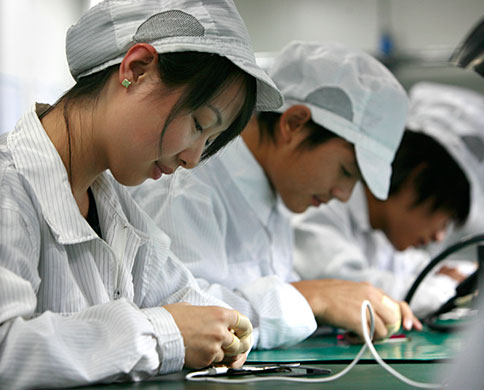Japan used to be one of the very few blank spots in Facebook's world map, along with Brazil and China. Now, finally, FB is conquering Japan, driving the former king to the corner.
Nikkei Business reports that Mixi, which used to be the top social network service in Japan, is on the sale block, although so far there is no formal announcement.
Mixi's demise is not only by Facebook's invasion, but also by its own "ad dependent" business model, Nikkei says. Mixi lost good chunk of ad sales after Lehman-shock in 2008. Their arch rival Gree turned itself into a mobile social game company quickly and found a gold mine in subscription+in-app sale business. Mixi tried to emulate it, starting 2011, but it was too little, too late.
What amazed me was the current size difference between Mixi and Gree. Mixi's annual sales as of fiscal 2011 (end in March) is 13.3 billion yen, net profit is 750 million yen, while Gree's is expected to be at 170 bil. sales/50bil. yen net profit. Market cap also is in different digit, with Mixi 25 bil./Gree 340 bil. yen. Another biggie in this space DeNA is also in the same range as Gree.
The article reports that Mixi is talking to multiple prospective buyers and players such as Gree and DeNA are expected to place a bid.
As a casual observer, it strikes me that even in Japan, the famous "Galapagos" market, Facebook's technical advantage finally wins out. Popular media often talked about "anonymous net culture in Japan vs. Facebook's real identity policy", but the point is definitely not there. It is the power of vast data behind it, the technological skill to extract the essence from it, and the existence of ideology of how to utilize that essence.
Yes, it was the power of Facebook, but I believe it was not just "aggressive American" thing or "sheer size". Mixi have neither technological power nor ideology.
Here is the original Nikkei article and my previous post about Gree:
http://business.nikkeibp.co.jp/article/topics/20120514/232015/?rt=nocnt
http://www.enotechconsulting.com/2012/05/japanese-government-plans-to-regulate-highly-speculative-mobile-game/
By the way, after this report, Gree, DeNA and other mobile social game companies decided to stop providing "comp-gacha" games. That is another source of confusion in this part of the industry, as these companies are expected to lose huge profit. Turbulent time is expected in Japan's web/mobile industry.

 According to Nikkei newspaper, Amazon Japan is planning to provide mobile data service as an MVNO.
It has been rumored that Amazon will start selling Kindle in Japan for some time, but this article refers not to Kindle, but just "SIM card". It says the plan is a prepaid plan with 1980 yen per month (approx. $23) for 500MB. Base service is provided by NTT DoCoMo, and Amazon is buying the capacity from its MVNO, Japan Communications (so Amazon will become a grandchild of DoCoMo, so to speak), and it can be used by any DoCoMo smartphone/tablets.
According to Nikkei newspaper, Amazon Japan is planning to provide mobile data service as an MVNO.
It has been rumored that Amazon will start selling Kindle in Japan for some time, but this article refers not to Kindle, but just "SIM card". It says the plan is a prepaid plan with 1980 yen per month (approx. $23) for 500MB. Base service is provided by NTT DoCoMo, and Amazon is buying the capacity from its MVNO, Japan Communications (so Amazon will become a grandchild of DoCoMo, so to speak), and it can be used by any DoCoMo smartphone/tablets.










